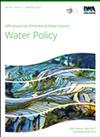Assessment of health impacts of quality water provisioning from groundwater sources: a micro-level study in India
IF 1.8
4区 环境科学与生态学
Q4 WATER RESOURCES
引用次数: 0
Abstract
Many nations have implemented policies to improve drinking water quality, but challenges arise from overexploited or contaminated groundwater-based sources. This paper aims at examining the aspects of water scarcity, security, and sustainability within an Indian village context. We attempt to compare two rural water supply sources in Nagla Chandi village in Uttar Pradesh, India: (a) untreated groundwater sourced from bore wells and (b) treated water from a reverse osmosis (RO) plant. We observed that subterranean minerals are the primary pollutants of unprocessed water drawn from borewells, which form the main source of drinking water. Even though water from the RO plant meets all the quality parameters of potability, frequent breakdowns of the plant due to improper management force the villagers to drink untreated water from the dug wells fitted with hand pumps, affecting their health. We also found a high incidence of water-borne diseases. The case analysis suggests enhancing village water treatment projects by training local artisans for system repair and increasing Panchayat staff to include trained engineers for technical advice and maintenance. The paper proposes reducing the cost of water testing in rural areas to make it possible for local organizations to regularly assess water quality and implement corrective actions.地下水源优质供水对健康影响的评估:印度的一项微观研究
许多国家实施了改善饮用水质量的政策,但过度开采或污染地下水源带来了挑战。本文旨在研究印度村庄的水资源短缺、安全和可持续性问题。我们试图比较印度北方邦 Nagla Chandi 村的两种农村供水水源:(a) 从井中抽取的未经处理的地下水;(b) 从反渗透(RO)设备中抽取的经过处理的水。我们观察到,地下矿物质是未经处理的井水的主要污染物,而井水是饮用水的主要来源。尽管反渗透设备的出水符合饮用水的所有质量参数,但由于管理不善,反渗透设备经常出现故障,村民们不得不饮用装有手泵的挖井中未经处理的水,影响了他们的健康。我们还发现水媒疾病的发病率很高。案例分析建议,通过培训当地工匠进行系统维修,增加村委会工作人员,让训练有素的工程师提供技术咨询和维护,从而加强乡村水处理项目。本文建议降低农村地区的水检测成本,使当地组织能够定期评估水质并采取纠正措施。
本文章由计算机程序翻译,如有差异,请以英文原文为准。
求助全文
约1分钟内获得全文
求助全文
来源期刊

Water Policy
环境科学-水资源
CiteScore
3.10
自引率
12.50%
发文量
81
审稿时长
6-12 weeks
期刊介绍:
Water Policy will publish reviews, research papers and progress reports in, among others, the following areas: financial, diplomatic, organizational, legal, administrative and research; organized by country, region or river basin. Water Policy also publishes reviews of books and grey literature.
 求助内容:
求助内容: 应助结果提醒方式:
应助结果提醒方式:


